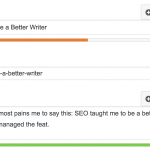As a a healthcare writer I often tell people how complex healthcare emotions are. And I write about how friends and family members can help patients through the complexity. But this week I was that friend/family member, and my knowledge didn’t help.
What do we tell people, and why isn’t it enough to manage the complex healthcare emotions that come with hospital visits, diagnoses, and patient care?
Patients Struggle to Focus
When we went to the hospital, I knew my role. First, I knew not to expect the patient to focus on the big picture. I knew she would get distracted easily by her own healthcare emotions, and ask a lot of questions that had nothing to do with what the doctor wanted her to understand.
But that didn’t help when she insisted I take notes on inconsequential things. Just because she was distracted didn’t suddenly provide me with clarity and insight. In fact, I struggled to take notes quickly enough, and when the doctor requested I not record the meeting I nearly panicked.
I needed to be the focused, disciplined one. But how could I reorient us to the questions she’d instructed me to ask, when the doctor was focused on the patient’s all-over-the-place questions?
Patients are Emotional
Second, I knew that the patient was going to be emotional, and might even lash out. I have previously warned people not to take this personally. It’s the friend or family member’s job to act as a professional, take in the emotion, and then find support elsewhere, later on.
But in the moment it’s heart wrenching. I didn’t feel angry or needy. Instead I felt helpless. I had to watch someone I love bursting into tears throughout the day, with nothing I could do. If I came near, she pushed me away. In those moments, knowing I had supports to help me later was not helpful.
Patients Can’t Handle Ambiguity
Another thing I knew to expect was the struggle between what providers say and what patients hear. More than anything else, I thought I was ready for this. After all, I’ve spent years negotiating language with subject matter experts who are doctors, and I know they hate giving imprecise answers. Ask a question like “can I have caffeine while on this medication?” and you’ll get far from a yes/no answer. I know how to translate those answers into the simple yes/no recommendation that the patient wants in the moment.
What I didn’t expect was that all my translations didn’t help. The patient asked about caffeine (and many other things), and the doctor answered in detail. The patient then reiterated the question, confused, and the doctor answered again. When the patient looked to me to help I gave my interpretation, and then the doctor expanded the answer – confusing the patient more.
When we left I typed up my notes and gave them to the patient, including some “editorial comments” synopsizing some of those confusing answers. The patient let me know that she didn’t trust my notes’ simplicity, and wanted to call the doctor again, because she still didn’t understand the answer.
Not All Help is Helpful
Lastly, I knew that many well-meaning people would volunteer their time, energy, and advice. I anticipated that many of these people would have just as much right to help as I did, and I might need to take a back seat, based on the patient’s wishes. I even expected that I might feel a little frustrated or sad if my help was not requested.
What I didn’t expect was the patient’s struggle to make this decision. The patient didn’t want a mob of us, but did not want to make the choice. And to be fair, given everything else a patient has to deal with, she shouldn’t have to!
Making support decisions in a way that doesn’t hurt anyone is incredibly difficult. Health and human emotions are, well… complicated.
What Can Help Us Navigate Complex Healthcare Emotions?
Now that I know the feeling, what would I write for friends and family members dealing with healthcare emotions?
- Whatever you’re doing, it’s helpful. Your friend or family member needs you. Even when you feel like you’re failing, you’re making things a little easier – and there is no perfect option.
- There doesn’t need to be one person in charge. Yes, it can help to have someone coordinating the care, but if there isn’t a clear person to delegate that’s ok. Switch out with other friends or family members.
- Try to get some time alone with the provider (let the patient know you’re doing this in advance). Let the provider know your concerns as a friend/family member and what you know about the patient that may help the provider treat them.
But beyond all this, I believe this is an issue of health literacy. Content strategists are here to improve communication. Sometimes that means writing guides, but sometimes it means working with providers to improve communication with patients, their family, and their friends.
So while I might be more empathetic toward family and friends of patients, there’s little I can offer for active advice. And we will continue to further health literacy initiatives to convey information simply and easily to patients.



I never knew you wrote this. I hope I wasn’t too harsh. 💗💗
Never! xo